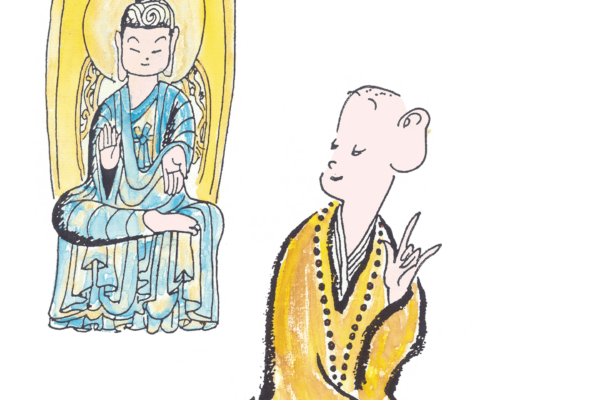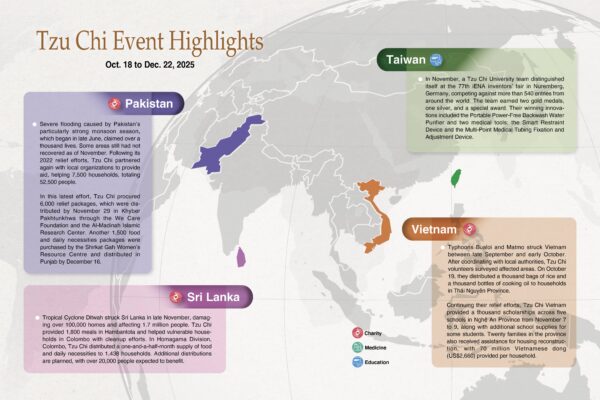By Chen Li-an and Li Wei-huang
Compiled and translated by Wu Hsiao-ting
Photos by Hsiao Yiu-hwa
The Institute for the Blind of Taiwan helps people relearn job skills and rebuild their lives after their worlds have been turned upside down with blindness.
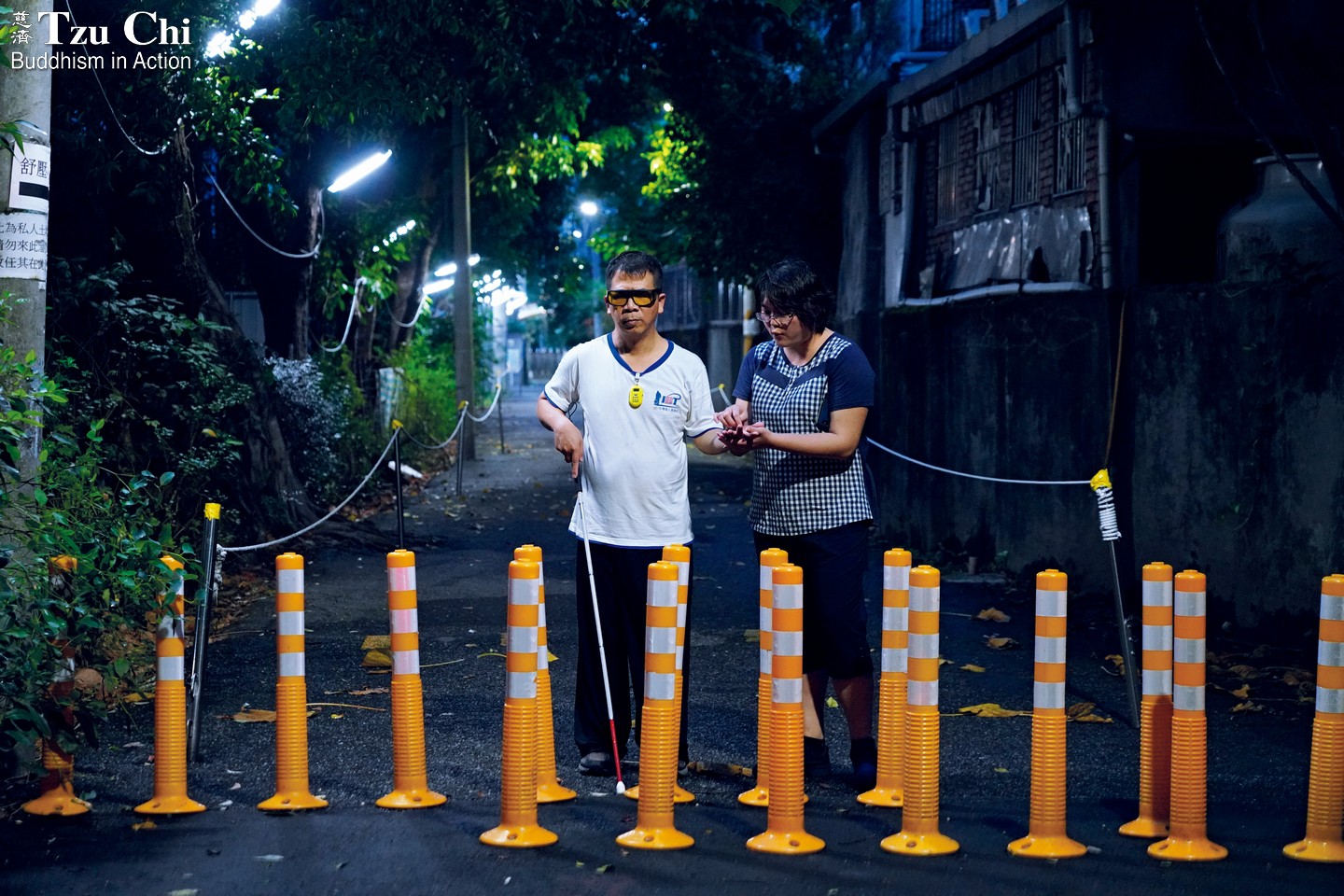
A student from the IBT learns how to use a white cane to navigate his way under the guidance of an instructor on a small road outside the institute where traffic is forbidden. Learning how to travel independently is an important step for the visually impaired as they work to return to society.
“
I almost killed myself that year,” said Hong Rong-xuan (洪榮選). Now 68 years old, he was once a taxi driver. Nine years ago, when he was taking a short break at work, his eyes suddenly felt like a piece of fabric had fallen over them—his originally bright world became all blurry.
An ophthalmologist later diagnosed Hong with an optic nerve stroke. The doctor said that it could have been caused by issues related to blood sugar, blood pressure, or sleep. Hong received treatment, but his condition didn’t improve. In fact, it grew worse. His left eye lost all vision and his right eye could only see indistinct contours. His almost complete blindness threw his world into disarray and caused him a great deal of suffering.
“I didn’t want to face anyone,” he recalled of that time. Feeling that he had become useless without his sight, he shut himself up; for three long years, he never once stepped out of his home. The only person who kept him company was his elderly mother. As one day blurred into the next, his thoughts and emotions sank deeper, following his sight down into the darkness.
From resistance to acceptance
For those people who become blind after living with sight, everything they used to take for granted in everyday life can become another trigger for frustration. Every step they take, literally and metaphorically, is accompanied by uncertainty and unease. Trailed by the constant shadow of fear, it’s easy for them to lose enthusiasm for life.
Many institutions in Taiwan offer assistance to the visually impaired to help them get back on their feet, but many blind people, like Hong Rong-xuan, are so depressed by their disability that they are unwilling to step out of their homes. Other factors, such as overprotective families or lack of information about available help, may also lead to a prolonged confinement at home. As a result, many of these folks end up not returning to society until several years later.
An important step for people with affected vision to live independently again is to relearn marketable skills. This helps them rediscover their dignity in life and decreases the financial and emotional burden on their family.
Wang Guo-hao (王國豪) graduated in 2018 from the Institute for the Blind of Taiwan (IBT) in Xinzhuang, New Taipei City, northern Taiwan. Like Hong Rong-xuan, he’s a victim of acquired blindness. At 27, he was diagnosed with Leber’s hereditary optic neuropathy, a disease caused by mutations in his mitochondrial DNA. His vision deteriorated so fast after the onset of the condition that he became blind in less than six months. He was the only one in his extended family diagnosed with the disease; before him, no one in his family had been discovered to have the genetic disorder.
After the diagnosis, Wang was told to prepare for the worst every time he visited the doctor. Even with the warnings ahead of time, he couldn’t bring himself to come to terms with his blindness when it became reality. His friends’ careers were all starting to take off, and it seemed that only his life had come to an abrupt halt. He couldn’t stop asking himself: “Why me?”
Despite being depressed and miserable, he didn’t want to become a burden to his family. A little more than a year after he fell victim to the disease, he enrolled in a massage course at the IBT with the help of his sister.
Wang admitted that he felt extremely uneasy when he first arrived at the institute. The massage course lasted nine months, during which time participants were required to live on campus. The unfamiliar environment as well as the course itself gave him immense pressure.
Wang remembers that he cried from the first class period to the last on the first day of the course at the institute. He kept thinking that he should have a better career choice in life, but he had no idea where else to go except for the institute. He did know one thing for certain: “If I give up now, I’ll be stuck where I am.”
People like Hong Rong-xuan and Wang Guo-hao, who lose their vision later in life, face challenges hard for sighted people to imagine. Mood swings are typical as they struggle to adjust to a life without sight. However, oftentimes it takes just a shift of mindset for them to turn their lives around.
After his mother passed away, Hong finally mustered enough courage to face himself. He reasoned with himself: “I can’t just shut myself away at home for the rest of my life.” He began looking for things he could accomplish alone. With the introduction of a friend who was a Tzu Chi volunteer, he began volunteering at the Tzu Chi Shuanghe Recycling Station in New Taipei City.
After some trial and error at the station, Hong discovered something he could do alone: tearing off page after page of paper for further sorting. That was five years ago. From that day on, he felt that he had found something to which he could anchor himself. He began reporting at the station every day it was open, rain or shine. His newfound sense of purpose, coupled with the care and support he received at the station, gradually helped him emerge from his gloom.
It takes nearly two hours for Hong to travel from his home to the recycling station. Traveling on his own to the station was especially difficult in the beginning, when everything was new and unfamiliar to him. Aside from the difficulties that came from the need to change buses, he had to depend on the help of strangers to find his way to the station. This was because he had never received orientation and mobility (O&M) training, which helps people with visual impairments to maintain travel independence. However, with the help of an umbrella or walking cane, which prevented him from bumping into things, and with the guidance of kind-hearted strangers, he gradually became comfortable and skilled at traveling on his own to the station.
From shutting himself up at home to venturing out on his own, Hong feels that the biggest change he’s experienced over the years is that he has almost forgotten that he can’t see. “I must’ve received help from over 4,000 strangers along the way,” he said. “Though I don’t know them, I’m really grateful to them.”
Wang Guo-hao’s life has also become better with the help he received at the IBT. His training, provided by the professional, hard-working IBT personnel, helped him regain his ability to take care of his daily needs and live independently. The support of his classmates, facing the same challenges in life, helped him find the courage to overcome the difficulties thrown in his way. He could also talk to social workers when he was down. Gradually, he became adjusted to his new life.
Wang graduated from the institute over a year ago. After passing a licensing exam, he now works as a masseur. Now that he can support himself, he’s able to face his future with more confidence. With a job to distract him, he is also less likely to dwell on negative thoughts. He is gaining surer footing.
Hong Rong-xuan dexterously tears off page after page of paper at a Tzu Chi recycling station. After losing his vision, he rediscovered his purpose in life by becoming a recycling volunteer.
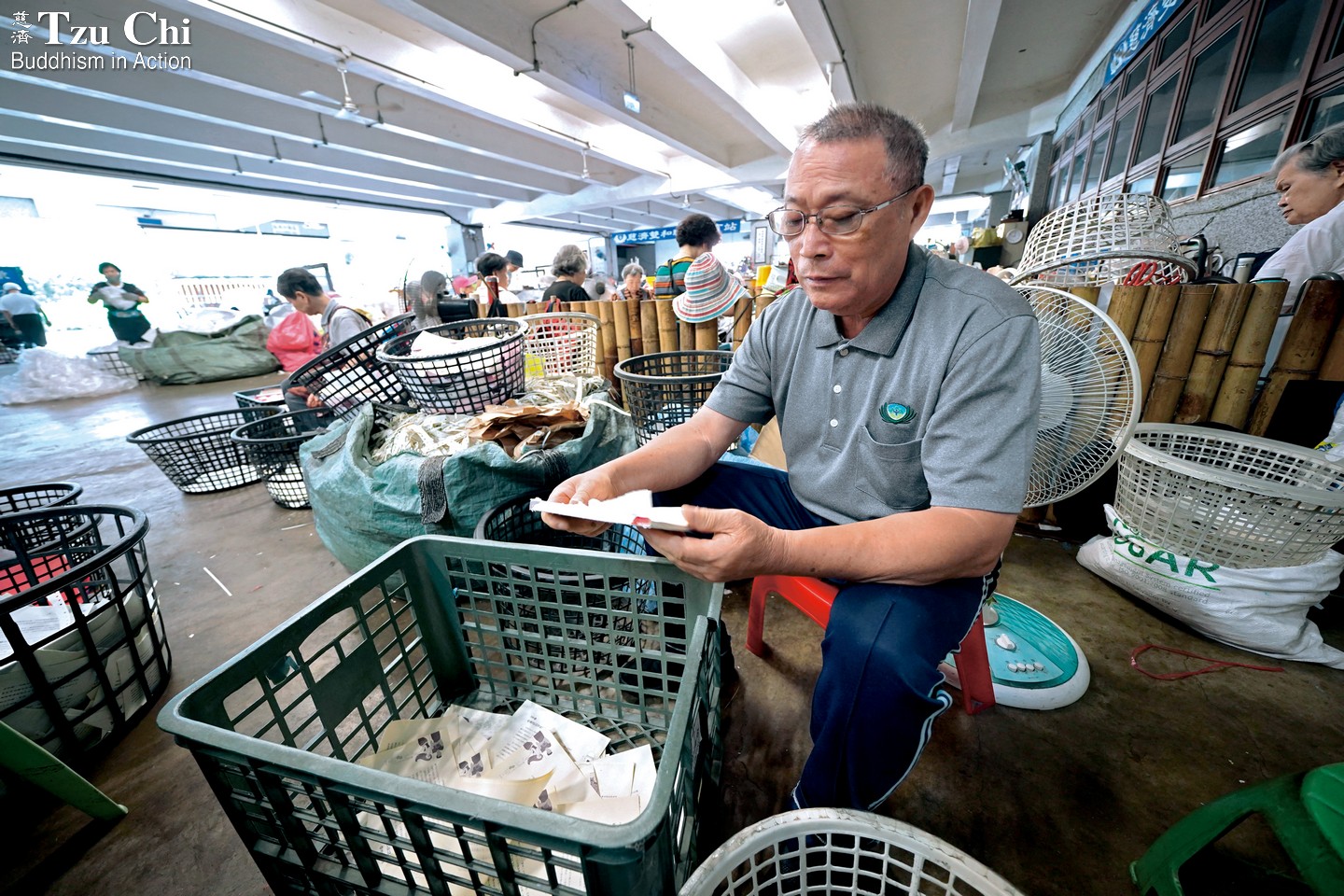
Another way to see the world
When you arrive at the Institute for the Blind of Taiwan, you first see an old, one-story building. But if you walk through that first building, you’ll come to a new building where classes are held. The hallways are quiet. Through the windows, you can see students listening intently to instructors as they teach massage skills and the meridian system in traditional Chinese medicine.
In addition to its massage program, the IBT helps people with varying degrees of visual impairment relearn how to take care of themselves. Courses are tailored to meet everyone’s needs, and training is conducted in real-life situations until one can tend to one’s own daily needs without having to rely on others’ help. Lin Xia-fei (林夏妃), a staffer at the institute, explained that it can take from half a year to three years for one to learn to live independently.
Orientation and mobility training, along with daily living skills training, are especially important in helping a blind person to achieve independence. As times change, the need to adapt is inevitable, and so the institute has also incorporated instruction on how to use technology, such as cell phones and computers.
Teaching braille was a major focus of the IBT in the early years of its history. It took students an average of two years to finish the course on braille. These days, however, most non-sighted people have shifted to relying on technology to connect with the world. Mobile apps designed for the visually impaired have also been developed to make their lives more convenient, apps that allow them to identify colors, read with their ears, write with their voices, surf the Internet, and stay in touch with friends and relatives.
Even though fewer and fewer non-sighted people are using braille, instruction on this form of written language for the blind hasn’t disappeared. The IBT still teaches its students basic braille and helps them to develop their tactile sensitivity so they can at least recognize their names in braille or know how to read the numbers when taking elevators.
Among all the types of training for the visually impaired, orientation and mobility training presents the biggest challenge. This training allows the unsighted to learn the techniques of using the white cane and how to move safely in different environments. Nevertheless, some people, unable to come to terms with their disability or not wanting to attract curious looks in public, refuse to use a white cane when they are out and about.
Zhang Zi (張自), head of the IBT, shared an example. She said that a former student, even after receiving O&M training at the institute, refused to use a white cane when he left his home. He often bumped into things or tripped and fell as a result. After experiencing several scares and frustrating incidents, he eventually broke down in a park and cried for more than an hour. Only after that did he make up his mind to use a white cane. “It wasn’t until that moment that he finally accepted himself,” Zhang said. “He realized that blind or not, he had to keep going.”
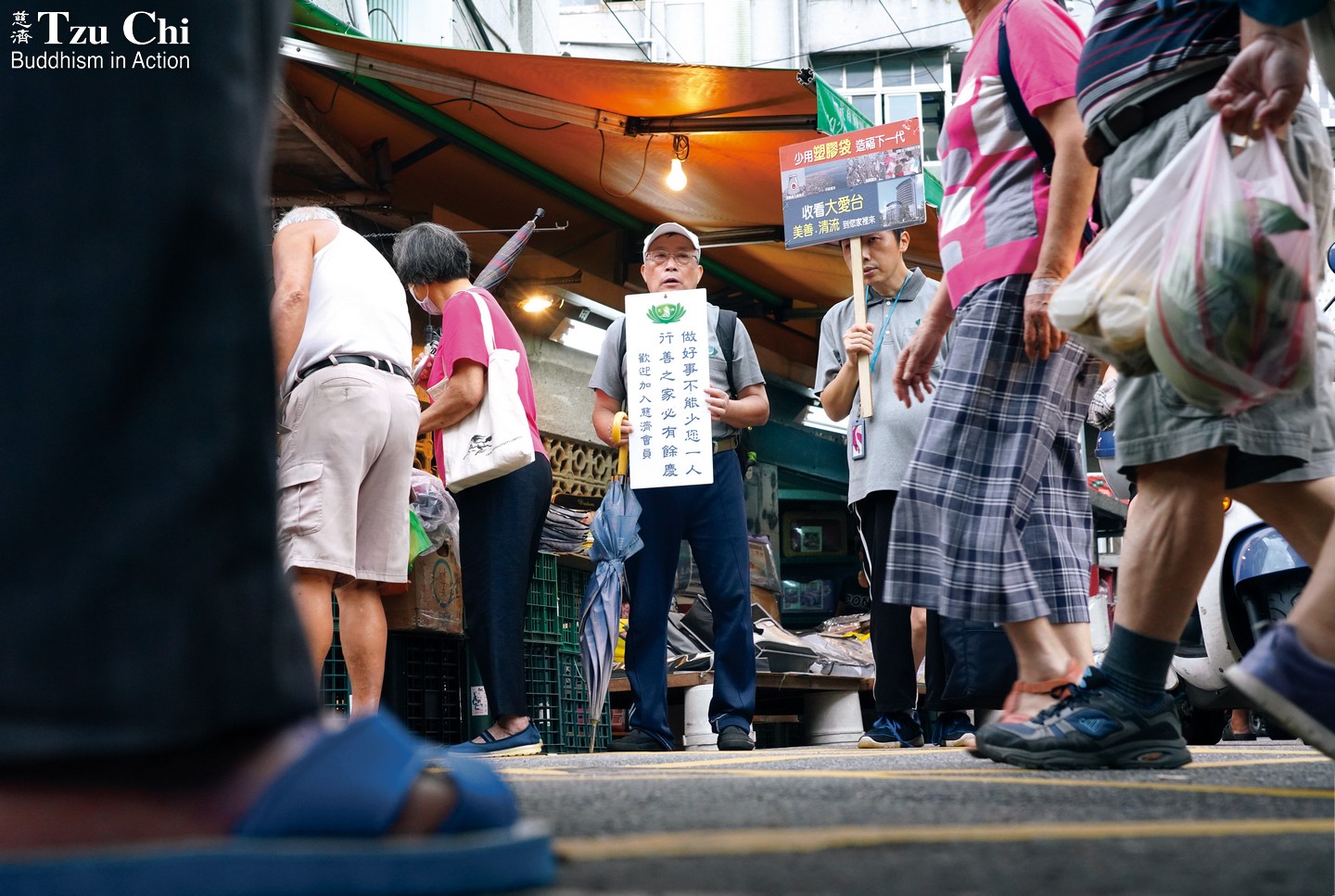
Every week, Hong and a fellow Tzu Chi volunteer promote reduced use of plastic bags and encourage people to join Tzu Chi as donating members by holding boards printed with the messages at a market and mass rapid transit station in Yonghe, New Taipei City. Though visually impaired, Hong’s desire to do good and help protect the environment is stronger than that of the average person.
Care and support
A light rain was falling, but the bright afternoon sun was out, and it was still stiflingly hot. The heat, however, couldn’t dampen the high spirits of students at the IBT. They were having a field trip and were really looking forward to it. A typical school day at the institute usually consists of intensive instructional and training sessions from morning to evening, so students appreciated down time like this when they could take a breather.
Tzu Chi volunteers are a constant presence during these field trips, which take place four times a year. Students might, for example, visit a bowling alley, old streets in Xinzhuang, or the National Palace Museum. Or perhaps, they are just out practicing their massage techniques on subjects in an out-of-school environment. But no matter where they go, Tzu Chi volunteers who have learned how to guide a blind person are there to help out along with teachers from the institute.
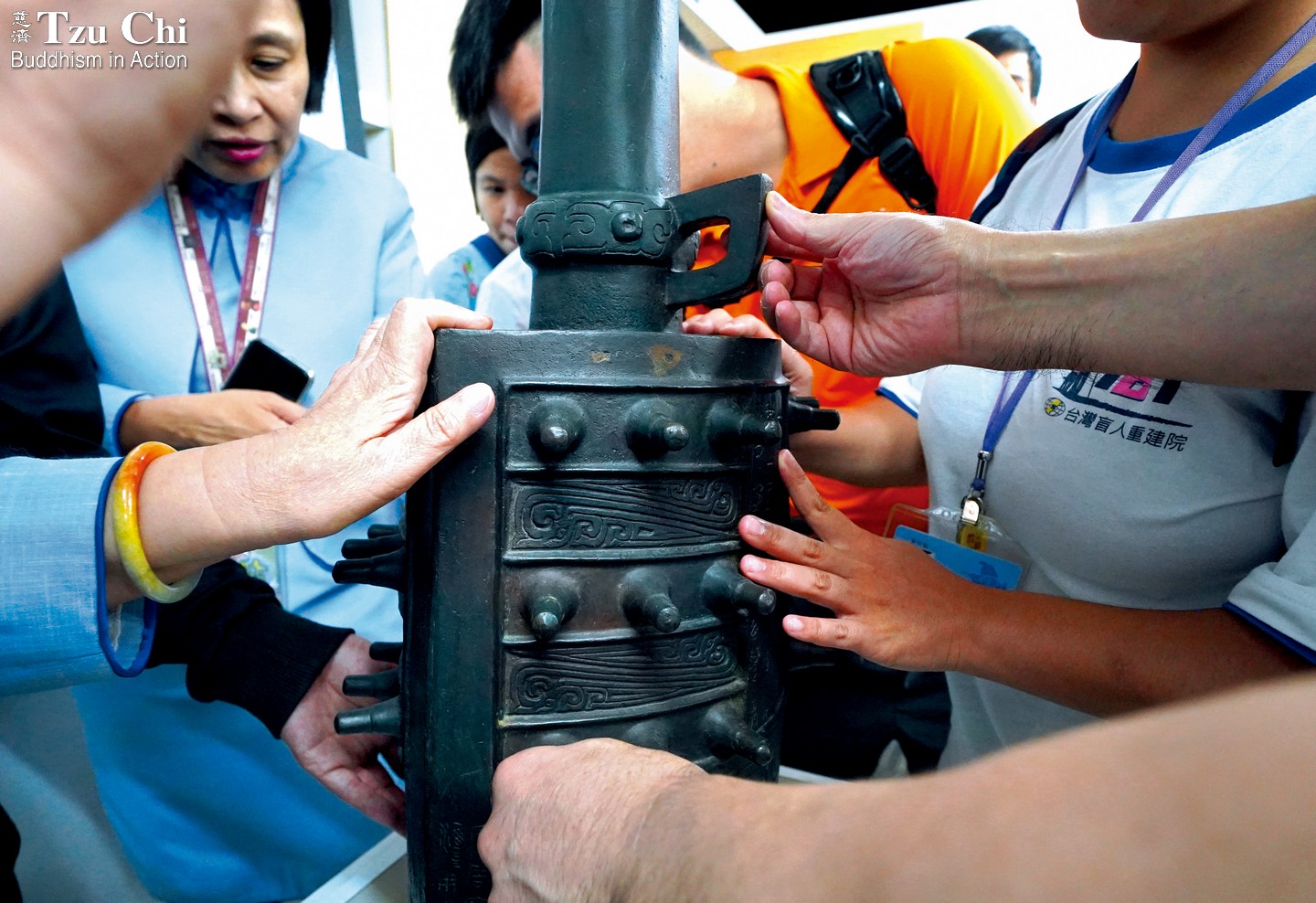
IBT students, guided by docents, feel by touch a made-to-scale replica of an antiquity on a visit to the National Palace Museum.
This afternoon, the students were visiting an elementary school in Xinzhuang to provide massage services. This was a practice session to prepare for a licensing exam that was coming up. Volunteers gave the students verbal cues as they carefully guided them to the school: “We’ve come to some steps;” “Downward slope ahead;” or “We’re crossing the road.” Xiao-hui, who was completely blind, was very thankful for the volunteers’ help. She said that she still felt nervous when she was out and about, and assistance like that from the volunteers put her at ease.
When the students were giving massages to teachers at the elementary school , Qiu Shu-yuan (邱淑媛), an instructor at the IBT, dropped tips and suggestions for improvement in a low voice to the students. Qiu explained that students learn massage techniques and related knowledge at the institute, and when they go out of the school for internship or practice sessions, they learn how to apply their skills to people of different occupations. This is necessary because people from different walks of life have different muscle conditions.
Qiu has served at the IBT for eight years. Her biggest wish is to see every student successfully return to society and live independently. She spoke of the challenges working at the institute: “The hardest part is getting rejected by the students. It’s not easy to win their trust. It requires a lot of time and effort. Thankfully, I have the support of a very good team.”
Students in the massage program at the IBT have to live on campus, which gives them time at night to study and prepare for their licensing exams. One Wednesday a month, Tzu Chi volunteers visit the students during their study time to provide care and support and to listen to them share their feelings and thoughts.
The institute doesn’t charge students any course fees. Even room and board are free. Though the government provides some funding, the IBT has to raise over half of its own operating costs. The financial burden on the school is therefore heavy—it’s in the red every year.
“It has been especially hard raising money in recent years,” said staffer Lin Xia-fei. “Some people even think we are a fraud gang.” She explained that due to changes in the larger environment, the number of regular donors has greatly decreased. Staffers have to work very hard to raise money. “If in the past we had to go out six times to solicit donations, we now have to go out 12,” she declared.
Tzu Chi stepped in after learning of their financial difficulties. In 2016, the foundation signed a cooperation agreement with the IBT to help finance the institute’s massage program. Over the past four years, partly because of Tzu Chi’s help, 63 course participants have passed their licensing exams and joined the workforce.
Lu Fang-chuan (呂芳川) is the director of Tzu Chi’s Department of Charity Mission Development. He feels Tzu Chi has done a very meaningful thing in aiding the institute, especially when he sees graduates start working to support themselves and their families. Many visually impaired people, after receiving training at the IBT and regaining the ability to live independently, also donate money to the institute. This is one way they can repay the love and care they have received from society.
Wang Guo-hao works at a massage parlor established by the IBT. The parlor provides stable job opportunities for new graduates. After passing his licensing exam, Wang returned to the workforce by working at the parlor.
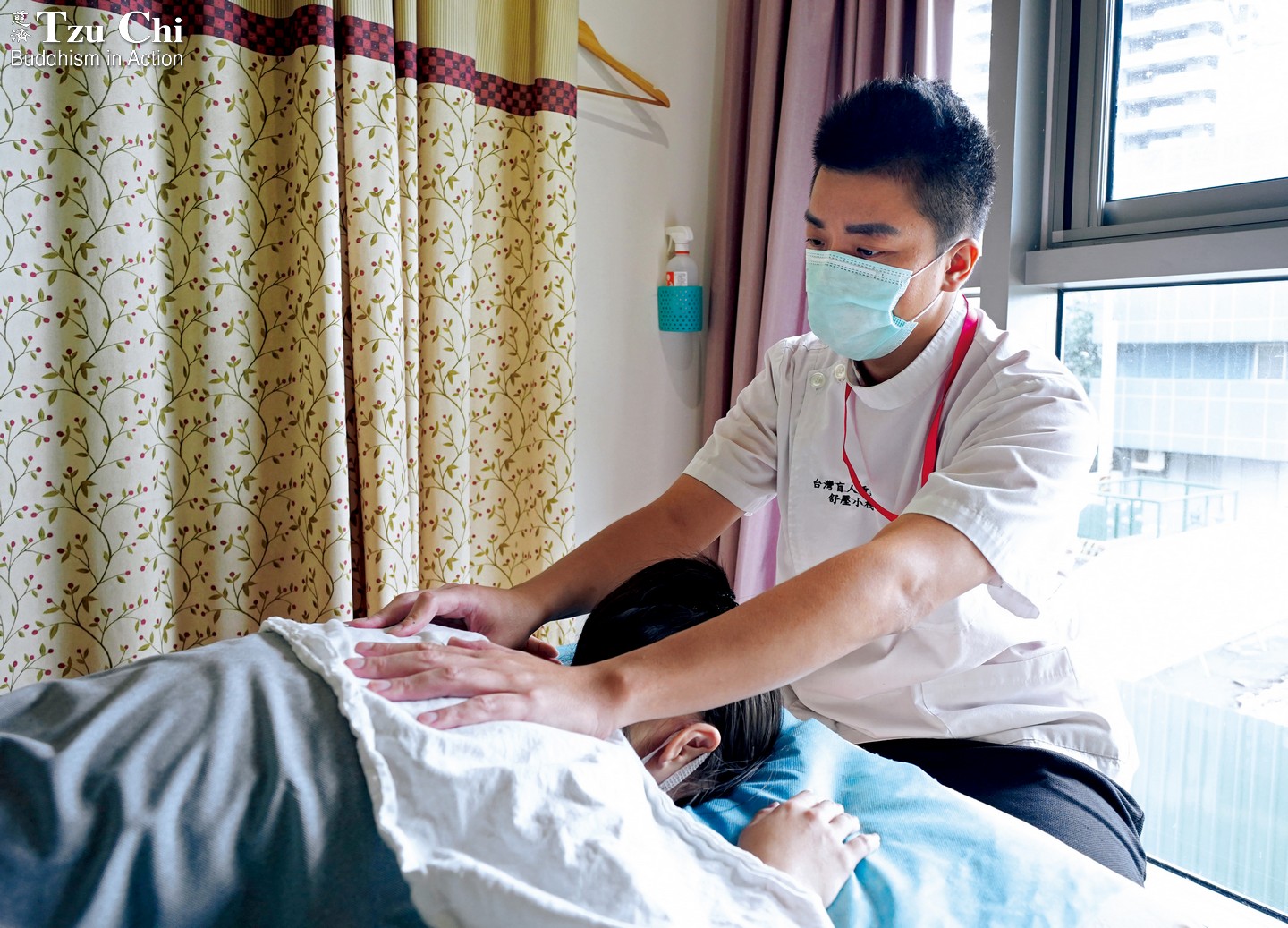
Zhang Zi, head of the IBT, said that “I might just as well disappear from the world” is a negative thought shared by many people who have just lost their sight. The loss of vision comes with severe psychological trauma and impact. If help is not offered promptly, the visually impaired can end up shutting themselves up at home for an average of five to seven years. On the other hand, if newly non-sighted persons can receive reconstructive resources quickly, the fear and pain they experience as they struggle in the darkness can be effectively reduced.
Students at the IBT are in different stages of acceptance. Some are still working hard to accept the reality of their lost vision. Others are doing what they can to get back on their feet. No matter what stage they are in, as long as they can rediscover their goals and purpose in life, their lives won’t continue to be submerged in darkness. They will eventually find their way out of the darkness by following the light in their hearts.

